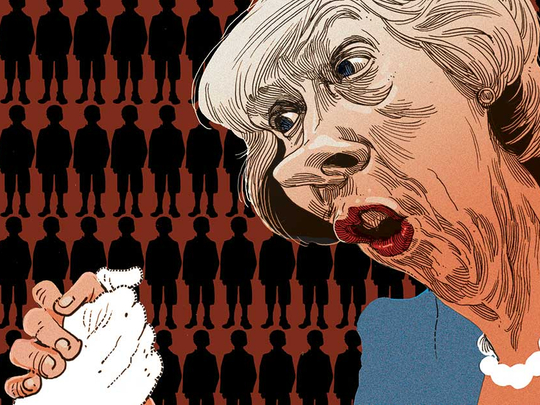
Heath was reminded of an age-old lesson of politics: That British elections are always about jobs, the National Health Service (NHS), tax, public spending, fairness and security. It’s never about a single theme, not even one a prime minister seeks to impose on it.
Like Heath, British Prime Minister Theresa May also wants the election she has called to be about a single issue. In her case, that issue is, to put it crudely, standing up to foreigners. She asks that we strengthen her hand in negotiations with Europe. But because she won’t say in detail what that hand is, it’s clear that what she really seeks is a free hand to do as her party wants. By rejecting TV debates — which should now be an essential element of any democracy — and speaking only to handpicked party cheerleaders, May wants to get through the campaign with scarcely a moment of scrutiny — and then secure a five-year parliament with minimal accountability.
But she’s asking for more than a blank cheque for Brexit. She intends to claim the result as a mandate for much else. And Britain cannot afford to give her carte blanche on the parlous state of the NHS, the biting cuts in education, the threats to civil liberties and our rising inequality. And one astonishing, but little-known fact demonstrates conclusively why: There will soon be more people in poverty in May’s Britain — 15.7 million citizens — than ever there were in former prime minister Margaret Thatcher’s Britain. And this new epidemic of poverty means almost one million more children condemned to poverty than even in the darkest days of the Thatcher-John Major rule.
Take a moment to absorb the numbers. Overall poverty, which hit 12.5 million people in the 1980s and 14 million in the mid-1990s, is, according to a study by the Institute for Fiscal Studies and Rowntree, set to reach a new high of 14.1 million this year, climbing fast to more than 15 million by the end of the coming parliament. In the early 1990s, pensioner poverty affected one in three older Britons. That rate was falling to nearly one in 10 by the time Labour left office. But those numbers will start deteriorating again, with 400,000 more elderly poor by 2022: A sure sign that a pensions lock and generous pension tax credits are a necessary bulwark against hardship in old age.
Blowing apart Conservative claim
But the biggest single group in poverty — one third of May’s new poor — are Britain’s youngest and most vulnerable, those who don’t have a vote, but certainly need a voice. Child poverty peaked at 4.3 million in the Thatcher-Major years and, mainly because of child tax credits, fell significantly under Labour. But it is rising again, from four million a year ago to 4.2 million this year, and, as calculated by IFS/Rowntree, will afflict 5.1 million by 2022.
Think about that: One in every three boys and girls condemned to a childhood of poverty, every one of those children denied the necessities of life, the fundamental means of fulfilling their potential. That fact alone blows apart any Conservative claim to be the party of the many. Despite a 35 per cent rise in prices this decade, child benefit will have risen by only 2 per cent and the working tax credit by only 4 per cent. Housing benefit no longer covers the rent, heating allowances fail to cover the cost of fuel, and crisis loans that used to cover cookers or beds have been dramatically slashed. But here’s the most shocking fact of all. Two-thirds of the children now in poverty are from families where someone is working.
Forget all the rancid Tory talk of “skivers” and “shirkers”: These are men and women working hard, but on breadline wages — with their lifeline, tax credits, being systematically pulled away from them. May says she wants to unite our country. Failing to halt this rising tide of poverty, she will leave us more economically divided and socially polarised than any prime minister in living memory. We are learning the hard way that social progress cannot be assumed, but has to be fought for decade by decade. That’s why we need to elect MPs who are all pledged on issues of social justice to expose, scrutinise and hold whoever is in power to account.
I don’t write off other parties’ candidates as uncaring, but it’s Labour candidates who get up in the morning with an animating mission to fight for and champion social justice. In this election, which will shape Britain for years, a Labour vote is essential to waging a war against poverty — because no one should ever have a free hand to wage war on the poor.
— Guardian News & Media Ltd
See also A2 Page 3










